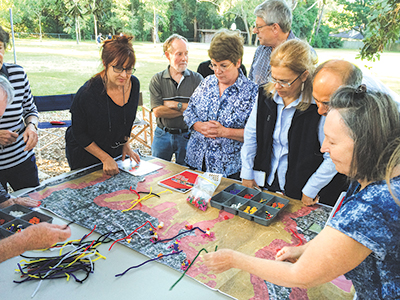Ku-ring-gai Council in Sydney has won a major award for its program encouraging community resilience in the face of extreme weather conditions.
The Council won the NSW Resilient Australia Government award for its Climate Wise Communities program this year.
Since its inception in 2011 the Climate Wise Communities project has evolved into a comprehensive package for councils and other agencies to help communities deal with extreme weather and the havoc it can play.
Traditionally the most common communication method in preparing for extreme weather events is for frontline agencies to rely on one-way information to the public. However evidence shows that this does not translate into behavioural change.
Along with a range of two-way communication methods, the Climate Wise Communities program introduces the notion of ‘shared responsibility’. The program allows councils and agencies to identify where they have responsibility and where residents need to take action themselves. It also bridges the gap between emergency managers who see community education as a lesser priority and councils who view community education as the responsibility of the emergency services.
The project incorporates guidelines, tools and tips on how to better prepare communities for extreme weather patterns and conditions linked to climate change. The toolkit is flexible enough to be oriented to any disaster type or context and is sensitive to the physical, social, financial and risk characteristics of each disaster.
The main outcome of the Climate Wise Communities program is that emergency management agencies, NGOs, councils and others have a coordinated approach to planning that integrates residents and keeps them active in the planning, preparation, response and recovery phases.
‘At risk’ community members are identified either by sector (e.g. aged care, seniors living independently, child care centres) or by location (e.g. bushfire hazard zones, known storm corridors, property characteristics). The process begins with improving people’s understanding of their vulnerability to extreme weather in terms of their location, property and lifestyle choices. This allows people to develop a good sense of why taking action is better than inaction.
Specially developed events and activities help people plan scenarios in extreme weather. The format follows the ‘serious play’ concept to capture people’s imagination and provoke thought. Climate Wise Communities provides a non-contentious atmosphere to discuss climate change impacts and empowers people with practical and refreshing solutions to the risks.
Another fundamental of the project is that it is low cost and applicable to a range of agencies tasked with resilience building. Because Climate Wise Communities is online, the materials, tools and format can be picked up anywhere in Australia or overseas. The resource manual and activity guidelines are self-explanatory, but Council staff members also offer phone and personal support to other councils embarking on a similar journey.
The project was positively reviewed by seven councils, NGOs and emergency services that trialled the toolkit. Macquarie University’s Dr Kirsten Davis said, “This program has a wide application across multiple disaster types and could be used to strengthen community resilience in almost any context.”
Ku-ring-gai Council is now exploring more ways of networking between councils, Local Emergency Management Committees and community groups as a portal for sharing information and aiding recovery from extreme weather events.
To find out more visit the Climate Wise Communities website at ww.haveyoursaykuringgai.com.au/climate-wise-communities-toolbox

















